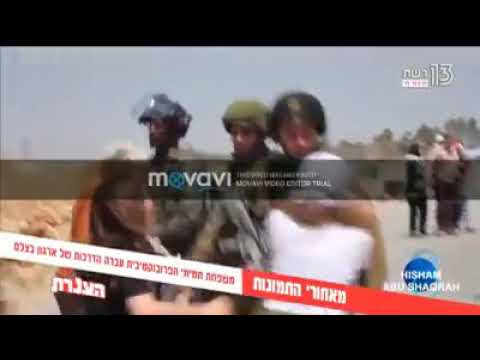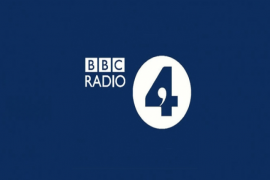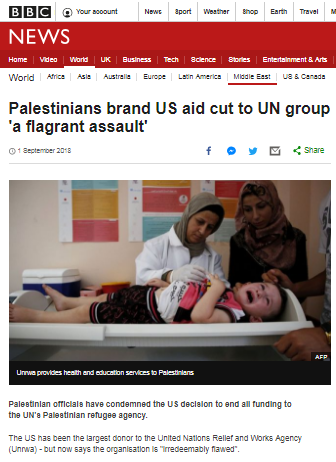As we have seen in previous posts, reports by BBC Arabic’s Nida Ibrahim on the topic of the release of Ahed Tamimi from prison were seen by viewers of BBC television and visitors to the BBC News website on July 29th.
BBC World Service radio audiences also got a dose of Ibrahim’s partisan reporting in the July 29th evening edition of ‘Newshour‘. Presenter James Menendez introduced her report (from 19:25 here) as follows: [emphasis in italics in the original, emphasis in bold added]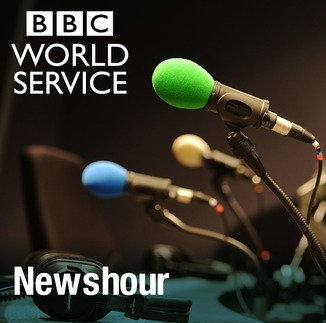
Menendez: “Now a Palestinian teenager’s been released from prison after serving an 8 month sentence for kicking and slapping an Israeli soldier. Video footage of Ahed Tamimi slapping the soldier at her home in the West Bank was widely viewed. She was jailed after pleading guilty to charges that included assault and inciting violence.”
As has been the case in all the BBC’s coverage of this latest instalment of the Ahed Tamimi story, the fact that the charge of incitement was the most serious of the charges against her – and its details – was erased from audience view. Menendez continued:
Menendez: “Ahed’s village has long campaigned against land seizures by Israel, leading to confrontation with Jewish settlers and Israeli troops. Many Israelis regarded the incident as a staged provocation. Nida Ibrahim reports now on the teenager’s release.”
‘Newshour’ audiences of course heard nothing about the obviously relevant subject of Ahed Tamimi’s father’s role in organising those Friday riots or that, together with other family members, Bassem Tamimi and his brother run a ‘news agency’ called ‘Tamimi Press’ which produces and distributes footage and images from the weekly agitprop, often featuring children from the Tamimi clan. Neither were listeners told that Ahed Tamimi’s mother Nariman – who filmed and distributed the footage mentioned by Menendez – has collaborated (along with additional members of the family) with B’tselem’s ‘armed with cameras’ project.
Ibrahim: “It was a little after 9 a.m. when Palestinian teenager Ahed Tamimi was released. But it had already been a long day for her family. On the road since four in the morning, they were chasing the location where the Israeli soldiers would release her and her mother who had also been held. They kept going back and forth between two checkpoints that are nearly two hours apart. Finally one relative shouted that he could see Ahed in an Israeli military jeep passing the Rantis checkpoint near [sic] the city of Ramallah.
The crowd followed the jeep which finally stopped at the entrance of the teenager’s home town of Nabi Saleh. There was a teary reunion for Ahed, her mother and the father – the long-time activist Bassem Tamimi, himself jailed nine times by the Israeli authorities. Ahed, wearing the traditional Palestinian kefiyyeh, looked tired but defiant. Later addressing journalists in the little square in the middle of her village, she had a message for Palestinian women held in Israeli jails.”
Voiceover Tamimi: “I see resistance will continue until the occupation is removed. All female prisoners in jail are strong and I thank everyone who stood by me while I was in prison and who stood with all women prisoners.”
BBC audiences were of course not told that those “Palestinian women held in Israeli jails” include people such as Marah Al-Bakri who stabbed an Israeli border policeman in Jerusalem in October 2015, Nurhan Awad who stabbed an elderly Palestinian man in Jerusalem in November 2015, Shorouq Dwayyat who stabbed an Israeli man in Jerusalem in October 2015 and Ibtisam Musa who attempted to smuggle explosives into Israel from Gaza.
In other words, the BBC is amplifying Ahed Tamimi’s whitewashing of the perpetrators of violent acts in a fashion more usually seen on official Palestinian Authority TV and radio.
Ibrahim continued with context-free presentation of a story also told in one of her earlier reports:
Ibrahim: “Not far away from where Ahed was standing is the grave of her cousin Izz al-Din al Tamimi. He was killed by Israeli fire in June while she was serving her eight-month sentence. One of Ahed’s first tasks was to visit the grave.”
Yet again BBC audiences were not informed that Tamimi and others initiated the June 6th violent rioting that led to his death.
“Soldiers had entered the village to arrest a suspect, according to the IDF. A group of more than 10 Palestinians threw stones at them and the army responded with riot dispersal methods.
According to the army, Tamimi threw a stone that hit a solider in the head. That soldier responded by firing at Tamimi, who was then treated medically at the scene before being declared dead.”
Neither were they informed that a terror faction claimed him as one of its members:
“The Democratic Front for the Liberation of Palestine (DFLP) issued a death notice for him which claimed al-Tamimi joined the organization in 2014. He was imprisoned in Israel twice, once for six months and once for a year, on the grounds of membership in the DFLP’s youth organization and participating in “resistance” [i.e., terrorist] activities.”
Listeners then heard Ibrahim glorify Ahed Tamimi’s violence while once more failing to explain that “resistance” is a euphemism for Palestinian violence against Israelis.
Ibrahim: “Ahed Tamimi has become an icon for Palestinian resistance for many here in the Palestinian territories. But on the other side of the perimeter wall, Israelis accuse her and her family of staging Palestinian propaganda – something her father denies.”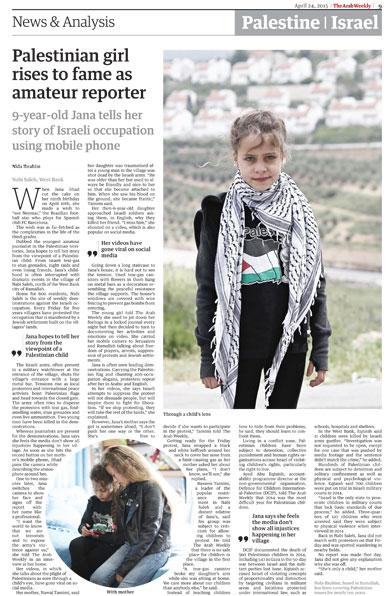
Yet again BBC audiences were not given any objective information about the Tamimi family’s activities – even though Nida Ibrahim is familiar with their exploitation of children for propaganda purposes. Listeners next heard a version of Ibrahim’s interview with Bassem Tamimi at his home previously seen on the BBC News website.
B. Tamimi: “To resist is to be normal. Not to resist: to be abnormal. And you must feel guilty because you keep…keep silent under occupation. We’re fighting for our dignity and for our rights.”
Ibrahim: “So you won’t try keep her safe at home, for example? You won’t try to…”
B. Tamimi: “Is home safe? Is home safe? I don’t think it’s safe. Where is the safe place in Palestine? I don’t know. And also…eh…I think the safer place that when you are ready to face.”
Ibrahim closed her third Tamimi puff piece in one day with more use of overtly politicised terminology:
Ibrahim: “Ahed’s case put a new spotlight to Israel’s detention of Palestinian children. Ahed herself said she would continue to resist the occupation.”
While the BBC has repeatedly pinned its colours to the mast in the seven months it has been reporting this story (see ‘related articles’ below) and the use of partisan language by BBC Arabic staff is certainly nothing new, the airing of these three one-sided reports by BBC Arabic reporter Nida Ibrahim – replete with repeated glorification of Ahed Tamimi and amplification of her and her father’s propaganda – leaves no doubt that the BBC has chosen to abandon impartiality and accuracy completely and instead lend its voice and outreach to promotion of a blatantly political campaign.
Related Articles:
One sided reports from BBC Arabic’s Nida Ibrahim – part one
One sided reports from BBC Arabic’s Nida Ibrahim – part two
BBC News one-sided reporting of Ahed Tamimi story persists
BBC News website promotes the Tamimi clan again
BBC News omits a relevant part of the Tamimi charges story
BBC radio’s inconsistent coverage of charges against Ahed Tamimi
BBC’s Knell reports on the Tamimi case again – and raises a question
BBC’s Bowen diverts Ahed Tamimi story with a disingenuous red herring
Jeremy Bowen’s Tamimi PR continues on BBC World Service radio
BBC continues its campaigning with eleventh report on Ahed Tamimi
BBC WS ‘Newshour’ continues to trivialise the Ahed Tamimi story
The BBC’s partisan coverage of the Ahed Tamimi case continues
BBC uses photo of exploited child to promote anti-Israel propaganda
Revisiting the BBC’s promotion of an anti-Israel activist

